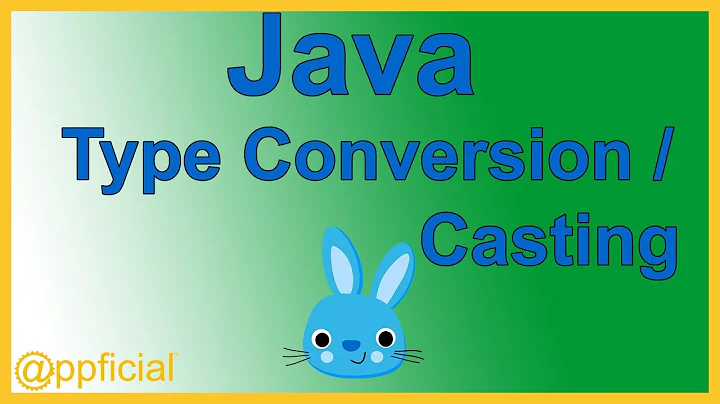How can I convert int[] to Integer[] in Java?
Solution 1
Native Java 8 (one line)
With Java 8, int[] can be converted to Integer[] easily:
int[] data = {1,2,3,4,5,6,7,8,9,10};
// To boxed array
Integer[] what = Arrays.stream( data ).boxed().toArray( Integer[]::new );
Integer[] ever = IntStream.of( data ).boxed().toArray( Integer[]::new );
// To boxed list
List<Integer> you = Arrays.stream( data ).boxed().collect( Collectors.toList() );
List<Integer> like = IntStream.of( data ).boxed().collect( Collectors.toList() );
As others stated, Integer[] is usually not a good map key.
But as far as conversion goes, we now have a relatively clean and native code.
Solution 2
If you want to convert an int[] to an Integer[], there isn't an automated way to do it in the JDK. However, you can do something like this:
int[] oldArray;
... // Here you would assign and fill oldArray
Integer[] newArray = new Integer[oldArray.length];
int i = 0;
for (int value : oldArray) {
newArray[i++] = Integer.valueOf(value);
}
If you have access to the Apache lang library, then you can use the ArrayUtils.toObject(int[]) method like this:
Integer[] newArray = ArrayUtils.toObject(oldArray);
Solution 3
Convert int[] to Integer[]:
import java.util.Arrays;
...
int[] aint = {1,2,3,4,5,6,7,8,9,10};
Integer[] aInt = new Integer[aint.length];
Arrays.setAll(aInt, i -> aint[i]);
Solution 4
Using regular for-loop without external libraries:
Convert int[] to Integer[]:
int[] primitiveArray = {1, 2, 3, 4, 5};
Integer[] objectArray = new Integer[primitiveArray.length];
for(int ctr = 0; ctr < primitiveArray.length; ctr++) {
objectArray[ctr] = Integer.valueOf(primitiveArray[ctr]); // returns Integer value
}
Convert Integer[] to int[]:
Integer[] objectArray = {1, 2, 3, 4, 5};
int[] primitiveArray = new int[objectArray.length];
for(int ctr = 0; ctr < objectArray.length; ctr++) {
primitiveArray[ctr] = objectArray[ctr].intValue(); // returns int value
}
Solution 5
Presumably you want the key to the map to match on the value of the elements instead of the identity of the array. In that case you want some kind of object that defines equals and hashCode as you would expect. Easiest is to convert to a List<Integer>, either an ArrayList or better use Arrays.asList. Better than that you can introduce a class that represents the data (similar to java.awt.Rectangle but I recommend making the variables private final, and the class final too).
Related videos on Youtube
Peter Mortensen
Experienced application developer. Software Engineer. M.Sc.E.E. C++ (10 years), software engineering, .NET/C#/VB.NET (12 years), usability testing, Perl, scientific computing, Python, Windows/Macintosh/Linux, Z80 assembly, CAN bus/CANopen. Contact I can be contacted through this reCAPTCHA (requires JavaScript to be allowed from google.com and possibly other(s)). Make sure to make the subject specific (I said: specific. Repeat: specific subject required). I can not stress this enough - 90% of you can not compose a specific subject, but instead use some generic subject. Use a specific subject, damn it! You still don't get it. It can't be that difficult to provide a specific subject to an email instead of a generic one. For example, including meta content like "quick question" is unhelpful. Concentrate on the actual subject. Did I say specific? I think I did. Let me repeat it just in case: use a specific subject in your email (otherwise it will no be opened at all). Selected questions, etc.: End-of-line identifier in VB.NET? How can I determine if a .NET assembly was built for x86 or x64? C++ reference - sample memmove The difference between + and & for joining strings in VB.NET Some of my other accounts: Careers. [/]. Super User (SU). [/]. Other My 15 minutes of fame on Super User My 15 minutes of fame in Denmark Blog. Sample: Jump the shark. LinkedIn @PeterMortensen (Twitter) Quora GitHub Full jump page (Last updated 2021-11-25)
Updated on March 10, 2022Comments
-
 Peter Mortensen about 2 years
Peter Mortensen about 2 yearsI'm new to Java and very confused.
I have a large dataset of length 4
int[]and I want to count the number of times that each particular combination of 4 integers occurs. This is very similar to counting word frequencies in a document.I want to create a
Map<int[], double>that maps each int[] to a running count as the list is iterated over, but Map doesn't take primitive types.So I made
Map<Integer[], Double>.My data is stored as an
ArrayList<int[]>, so my loop should be something like:ArrayList<int[]> data = ... // load a dataset` Map<Integer[], Double> frequencies = new HashMap<Integer[], Double>(); for(int[] q : data) { // **DO SOMETHING TO convert q from int[] to Integer[] so I can put it in the map if(frequencies.containsKey(q)) { frequencies.put(q, tfs.get(q) + p); } else { frequencies.put(q, p); } }I'm not sure what code I need at the comment to make this work to convert an
int[]to anInteger[]. Or maybe I'm fundamentally confused about the right way to do this.-
newacct almost 15 years"I want to create a Map<int[], double> ... but Map doesn't take primitive types." As one of the posts below pointed out, int[] is not a primitive type, so that is not the real problem. The real problem is that arrays do not override .equals() to compare the elements. In that sense converting to Integer[] (as your title says) does not help you. In the code above, frequencies.containsKey(q) would still not work as you expect because it uses .equals() to compare. The real solution is to not use arrays here.
-
Mureinik over 7 yearsDon't want to spam with another answer, but worth noting there's now a documentation example about this.
-
-
 Admin almost 15 yearsMany thanks for your reply I tried this first and it compiled fine, but it seems like
Admin almost 15 yearsMany thanks for your reply I tried this first and it compiled fine, but it seems likefrequencies.containsKey(q)would always be false even if I'veputthe same array twice - is there some glitch here involving java's definition of equality with int[]'s? -
Brett almost 15 yearsOh, here's an array conversion question, just the other way around: stackoverflow.com/questions/564392/…
-
Brett almost 15 years(Hint, (new int[0]).equals(new int[0]) is false; (new ArrayList<Integer>()).equals(new ArrayList<String>()) is true.
-
sleske almost 15 yearsBad idea, as array comparison is based on reference equality. That's why Arrays.equals() exists...
-
Brett almost 15 yearsI'd make the class final, and the field private final. Make a defensive copy of the array in the constructor (clone). And just return the value from Arrays.equals rather than have that peculiar if statement. toString would be nice.
-
Brett almost 15 yearsOh and throw an NPE from the constructor (probably calling clone) for null data, and not have the check in hashCode.
-
Mihai Toader almost 15 yearsTrue .. But the code for equals, hashCode is generated by IDEA :-). It works correctly.
-
James Becwar almost 12 yearsthats a nasty way to do a for loop.
-
Dahaka almost 12 yearsThis is a perfectly normal for each... I don't see the nasty part.
-
lcn over 10 years@Dahaka, the nastiness is in using an iterator of
valuewhile the indexing variableiis there. -
Eddie over 10 years@Icn, I can see why some people wouldn't prefer that style, but what makes it so undesirable as to be nasty?
-
eldur about 10 yearsWith Guava I would prefer
List<Integer> intList = Ints.asList(oldArray); -
Zero3 almost 10 yearsI don't see much value in keeping this answer "for reference" when it doesn't work. The documentation for System.arraycopy() even states that it won't work for this purpose.
-
 daiscog over 9 years@icn, @Dahaka: The nastiness is that since you're already using an incrementing index variable, there's no need to use a for-each, too; although it looks pretty and simple in the code, behind the scenes that involves unnecessary overhead. A traditional
daiscog over 9 years@icn, @Dahaka: The nastiness is that since you're already using an incrementing index variable, there's no need to use a for-each, too; although it looks pretty and simple in the code, behind the scenes that involves unnecessary overhead. A traditionalfor (int i...)loop would be more efficient here. -
aw-think about 9 yearsThat's meanwhile the correct way. If you need the Integer-Array as a list you could write:
List<Integer> list = IntStream.of(q).boxed().collect(Collectors.toList()); -
 YoYo almost 9 yearsto convert to an
YoYo almost 9 yearsto convert to anInteger[]I would actually suggest using following syntax:Integer[] boxed = IntStream.of(unboxed).boxed().toArray();In the similar fashion as @NwDx -
 Sheepy almost 9 years@JoD. Yes, that works. But
Sheepy almost 9 years@JoD. Yes, that works. ButIntStream.ofcallsArrays.streamanyway. I think it comes down to personal preference - I prefer one overridden function, some love using more explicit class. -
 YoYo almost 9 yearsFix the signature of
YoYo almost 9 yearsFix the signature oftoArrayin your example, and then we are in agreement. As a matter of fact, I might prefer your version instead. -
 Sheepy almost 9 years@JoD. Yes it is sad. But as long as the stream is boxed (i.e. not an IntStream),
Sheepy almost 9 years@JoD. Yes it is sad. But as long as the stream is boxed (i.e. not an IntStream),toArraywill always need a constructor, regardless of the source. -
 Sheepy almost 9 years@JoD. I got compilation error
Sheepy almost 9 years@JoD. I got compilation errorObject[] cannot be converted to Integer[]. Both on my pc and on ideone: ideone.com/uagsSd -
aw-think almost 9 years@Sheepy: I prefer the usage of IntStream, because it is more related to the type of data in that stream. The Arrays class is more to manipulate arrays and not streams (even if some methods create streams). So if a third person is reading your code, he/she exactly knows whats going on. It's more readable to say: Make an IntStream of that int array, box it, and make an array or collect a list. As if you say: Arrays make a stream from that int array (what type of?) and box it (to what?). But all of this is a matter of taste.
-
 YoYo almost 9 yearsI am eating my shoe. I was simply wrong - I thought I tried it out, but obviously didn't.
YoYo almost 9 yearsI am eating my shoe. I was simply wrong - I thought I tried it out, but obviously didn't.boxed(), just returns a typedStream<Integer>, but still needs a typed array generator for thetoArrayto return the correctly typed Array, otherwise it is going to beObject[]. I guess that has it benefits too, plus there is probably no other way. -
 Sheepy almost 9 yearsThanks for supporting JoD. I start from the parameter type which is an array, and it is uniform as you an handle most arrays with one function. But I just figured that I can add both syntaxes in the answer :p @NwDx
Sheepy almost 9 yearsThanks for supporting JoD. I start from the parameter type which is an array, and it is uniform as you an handle most arrays with one function. But I just figured that I can add both syntaxes in the answer :p @NwDx -
 YoYo almost 9 years@NwDx somehow I also instinctively use
YoYo almost 9 years@NwDx somehow I also instinctively useIntStream.of, but I thinkArrays.streamwill be favored by many because it's type neutrality due to the overloading. -
aw-think almost 9 years@JoD. Full ack. If one don't know the type of data than he/she is not able to create an Array of Integer, as you need the type of data for creation. Only untyped lists with the collectors are possible. Or am I wrong?
-
 YoYo almost 9 yearsWe need to think JEP 169 where explicit primitive typed classes will be likely deprecated.
YoYo almost 9 yearsWe need to think JEP 169 where explicit primitive typed classes will be likely deprecated. -
 Sheepy almost 9 years@JoD. I do not see where did JEP 169 mention deprecation of boxed primitive class. Plus it has low priority and progress is non-existent.
Sheepy almost 9 years@JoD. I do not see where did JEP 169 mention deprecation of boxed primitive class. Plus it has low priority and progress is non-existent. -
 Sheepy almost 9 years@NwDx Well, compared with
Sheepy almost 9 years@NwDx Well, compared withArrays.stream,IntStream.ofand other primitive streams also require you to know the data type. In fact if the data type change, the later just result in more code change. -
 YoYo almost 9 years@Sheepy part of project Valhalla. The deprecation was just my interpolation of things to come.
YoYo almost 9 years@Sheepy part of project Valhalla. The deprecation was just my interpolation of things to come. -
 Holger almost 8 yearsThis
Holger almost 8 yearsThisIntArrayWrapperdefinitely is the right approach for using anint[]array as hash key, but it should be mentioned that such a type already exists… You can use it to wrap an array and not only has ithashCodeandequals, it’s even comparable. -
Globox over 6 yearsCan this be applied to 2D array? Can
int[][] dataconverted toInteger[][] whatever? -
 Sheepy over 6 years@Chetan It is possible to apply to multiple dimensions, but I strongly advise against it (better use proper loop), because this approach doesn't scale at all:
Sheepy over 6 years@Chetan It is possible to apply to multiple dimensions, but I strongly advise against it (better use proper loop), because this approach doesn't scale at all:Integer[][] newData = Arrays.stream( data ).map( row -> Arrays.stream( row ).boxed().toArray( Integer[]::new ) ).toArray( Integer[][]::new )- -
 Eel Lee about 6 yearsThis is rather inaccurate due to autoboxing. In 1st example you can simply do
Eel Lee about 6 yearsThis is rather inaccurate due to autoboxing. In 1st example you can simply donewArray[i] = ids[i];and in 2nd onenewArray[i] = WrapperArray[i]:) -
 Vijay Chavda about 6 yearsWhat is this new syntax:
Vijay Chavda about 6 yearsWhat is this new syntax:Integer[]::new? -
 Sheepy about 6 years@VijayChavda The new syntax, called method references, was introduced in 2014 with Java 8 as part of lambda (JSR 335 Part C). It means
Sheepy about 6 years@VijayChavda The new syntax, called method references, was introduced in 2014 with Java 8 as part of lambda (JSR 335 Part C). It meansthe "new" method (constructor) of the Integer[] class. -
forkdbloke over 4 yearsHi Tunaki, can you please explaing the above code for me? when i run through debugger, i see that get and size method gets called automatically, i.e with out them being called explicitely !! how so?! can you please explain?
-
 mcvkr about 3 yearsI saw almost same nastiness in our professor's solution to a homework, it was in C, 17 years ago. My experience showed me almost never trying to write some code shorter really helps anymore.
mcvkr about 3 yearsI saw almost same nastiness in our professor's solution to a homework, it was in C, 17 years ago. My experience showed me almost never trying to write some code shorter really helps anymore. -
 mcvkr about 3 yearswant to see something as nasty : stackoverflow.com/questions/1642028/…
mcvkr about 3 yearswant to see something as nasty : stackoverflow.com/questions/1642028/… -
 Peter Mortensen about 2 yearsEven if it worked like a charm, an explanation would be in order. E.g., what is the idea/gist? On what system (incl. versions) and with what version of Java was it tested on? From the Help Center: "...always explain why the solution you're presenting is appropriate and how it works". Please respond by editing (changing) your answer, not here in comments (without "Edit:", "Update:", or similar - the answer should appear as if it was written today).
Peter Mortensen about 2 yearsEven if it worked like a charm, an explanation would be in order. E.g., what is the idea/gist? On what system (incl. versions) and with what version of Java was it tested on? From the Help Center: "...always explain why the solution you're presenting is appropriate and how it works". Please respond by editing (changing) your answer, not here in comments (without "Edit:", "Update:", or similar - the answer should appear as if it was written today).









![How can I convert int[] to Integer[] in Java - Array](https://i.ytimg.com/vi/YqU7QsZOCC4/hq720.jpg?sqp=-oaymwEcCNAFEJQDSFXyq4qpAw4IARUAAIhCGAFwAcABBg==&rs=AOn4CLBFHdF9Lj6zM0fMc0B7eC8fZ2J89g)